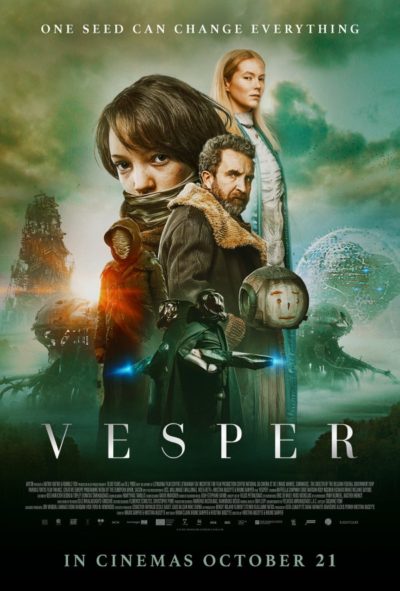★★★½
“Battle Angel Nausicaa”
 As the above suggests, I was getting a strong manga influence, in particular from the works of Hayao Miyazaki: it feels like the script could have been something he’d have written on a gloomy Wednesday in January. Feisty teenage heroine? Check? Ecological message? Check. For this takes place after some kind of change in the world, which has left the bulk of the population clinging on to existence by their grubby fingernails, in a world now owned by bizarre flora. Vesper (Chapman) is one such, tending to her paralyzed father (Brake) whose consciousness has been transferred into a drone. She trades with her uncle, Jonas (Marsan), swapping blood for the seeds they need to survive.
As the above suggests, I was getting a strong manga influence, in particular from the works of Hayao Miyazaki: it feels like the script could have been something he’d have written on a gloomy Wednesday in January. Feisty teenage heroine? Check? Ecological message? Check. For this takes place after some kind of change in the world, which has left the bulk of the population clinging on to existence by their grubby fingernails, in a world now owned by bizarre flora. Vesper (Chapman) is one such, tending to her paralyzed father (Brake) whose consciousness has been transferred into a drone. She trades with her uncle, Jonas (Marsan), swapping blood for the seeds they need to survive.
Yet there’s also elements of Battle Angel Alita, with a sharp delineation between the haves and the have-nots. The latter live privileged lives in Citadels, served by artificial lifeforms called “jugs”, and as suppliers of the seeds, hold everyone else in their control. One day, a Citadel craft crashes near Vesper’s home, and she rescues Camelia (McEwen) from the wreckage. She promises to take Vesper and her father back to her home. Yet it eventually becomes clear that Camelia is not being 100% honest about her own situation either. On the other hand, she is potentially the key to liberating everyone from under the thumb of the Citadels, and ending their monopoly on the resources necessary for survival. It’s not something the rulers will give up easily, however.
This is rather ponderous in its progress, running close to two hours, and is clearly content to take its time getting to any of its points. If you’re willing to accept that, there’s a lot to appreciate here, not least some great visual style and world-building. This has to be one of the most fully convincing post-apocalyptic landscapes I’ve seen, a remarkable achievement considering its budget was a mere five million Euros. Vesper is a heroine right out of the Nausicaa playbook: someone who is smart and brave, rather than physically strong, devoted to her family, and who has an inherent affinity for the natural world. Her mother left the family, under circumstances best described as murky, and Camelia is a surrogate, to some extent.
It does feel as if the makers fell in love with their creation a little more than I did, and wanted to wallow in the imagination, at the expense of developing the plot. No-one seems in a particular hurry here, and for every scene which moves the story forward, there’s another that seems to exist purely as a visual showcase. I think it might work better at 90 minutes than 120 – or alternatively, expanded beyond the confines of a feature film. This is the kind of thing I could certainly imagine HBO developing into a series. The ending came close to toppling into “Eh?” territory, before a final shot where it made sense, and wrapped things up on easily the most optimistic note we’d heard. Miyazaki would likely approve.
Dir: Kristina Buozyte, Bruno Samper
Star: Raffiella Chapman, Rosy McEwen, Eddie Marsan, Richard Brake




